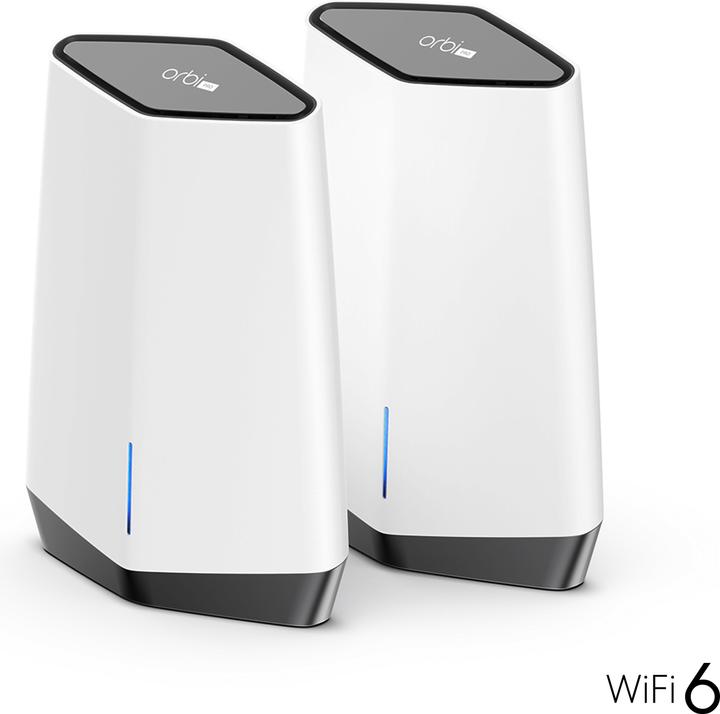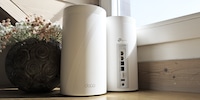
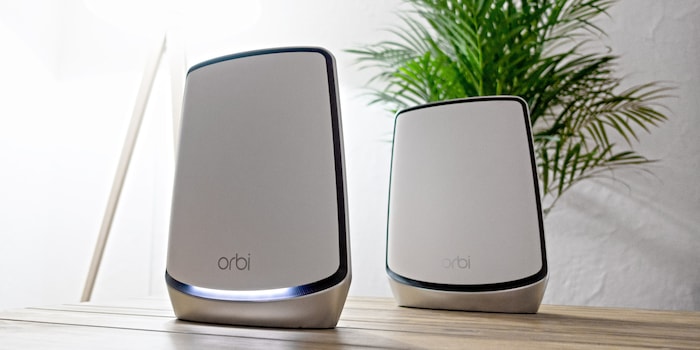
Netgear dethrones Swisscom: Orbi AX6000 in the mesh Wi-Fi speed test
The Wi-Fi 6 mesh system Orbi AX6000 is the latest speed test front runner. Netgear easily dethroned Swisscom's AX mesh solution in my living room, and it set the bar higher for future test products. How high, you'll find out in this article.
I can never have too much Wi-Fi in my pad. In this speed test with the Orbi AX6000, Netgear beats a Swisscom mesh – made up of an Internet-Box 3 and WLAN-Box 2 – as well as an Asus mesh, which is comprised of two ZenWiFi AX routers. But only in the 5 GHz frequency band. Asus retains its winning title in the slower 2.4 GHz band.
Netgear offers different Orbi Mesh systems with WiFi 6 – in other words, the IEEE 802.11ax standard. Here's the AX4200 with six antennas per device:

Then there's the Orbi Pro AX6000 with eight antennas, designed with small businesses in mind:
And the third system in the group is the Orbi AX6000, which also comes with eight antennas but without a pro version. This is the system I'm testing out in my flat just now to compare the performance with that of the Wi-Fi 6 Mesh systems from Swisscom and Asus:
Theoretically, both of the AX6000 systems have the same speed capabilities and can supply up to 12 streams simultaneously. The AX4200, on the other hand, can only supply eight streams. As well as the design and presumably different antenna design, the pro version gives you access to four distinct SSIDs, while the home version, the Orbi AX6000, only features two.
Orbi AX6000 mesh system specs (router and a satellite):
- Processor: 2.2 GHz quad-core processor
- Router memory: 512 MB NAND flash and 1 GB RAM
- Antennas per device: 8 × internal
- Router ports: 1 × RJ45 WAN (2.5 Gigabits), 4 × RJ45 LAN (Gigabit)
- Satellite ports: 4 × RJ45 LAN (Gigabit)
- 5 GHz network standards: IEEE 802.11ax/ac/n/a
- 2.4 GHz network standards: IEEE 802.11ax/n/b/g
- 2.4 GHz transfer rate: up to 1200 Mbps (editor's note: theoretically up to 287 Mbps per stream)
- 5 GHz transfer rate (second band): up to 2400 Mbps (editor's note: theoretically up to 1201 Mbps per stream)
- 5 GHz transfer rate (third band): up to 2400 Mbps
- Encryption: WPA3-Personal (SAE), WPA2-PSK (AES), WPA-PSK (TKIP)
- Modes of operation: router, access point
- Dimensions: 25.4 × 7.1 × 19.1 cm, 907 g
- Operation: sync button, reset button
- Features: including tri-band Wi-Fi, beamforming, MU-MIMO, OFDMA, guest network, VPN service, UPnP
Having 5 GHz across two bands is what gives you backhaul. This means the third band acts as a communication channel between the router and the satellite. And this is what makes the speeds in their marketing and packaging and the speeds quoted by other manufacturers somewhat misleading.
Get the ultimate experience with 12 streams of Wi-Fi 6 and speeds up to 6 Gbps.
Up to 6 gigabits per second? So, 0.75 gigabytes, in other words? No way. As is the case with other manufacturers, Netgear is just adding all the speeds together from the three bands that are theoretically possible. And that just doesn't make any sense. Unless customers are impressed by vague phrases filled with large numbers. This is what should really be on the packaging:
The system supports 12 parallel streams, which can in theory be supplied with up to 2400 Mbps in the 5-GHz band and up to 1200 Mbps in the 2.4 GHz band via a satellite. If you mix the frequency bands, performance via the satellite will be capped at 2400 Mbps, which is equivalent to the backhaul. And with the ax standard (i.e. Wi-Fi 6), at 5 GHz per stream, up to 1201 Mbps is possible in theory, while at 2.4 GHz, up to 287 Mbps is possible.
The system is also available as a three pack – a router plus two satellites – for houses and large flats. You can even get the pro version as a four pack. What's more, you can buy satellites individually to add them to your set-up. See all our Orbi AX products here.
Flat layout and router/satellite location
To get comparable results, I always test at the same location. The router is on the upper floor of my top storey, 140 m² duplex at the most central cable connection. Meanwhile, the satellite is on the floor below in the entrance hall, where individual routers gave the strongest signal on previous tests.
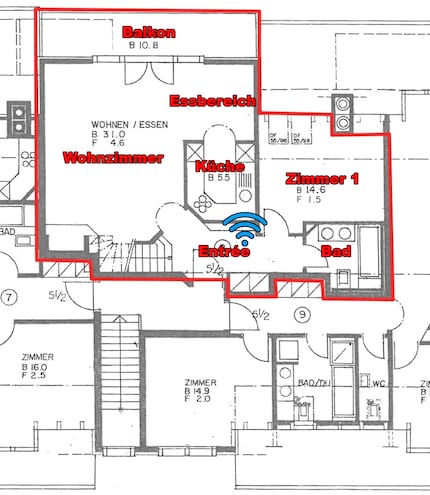
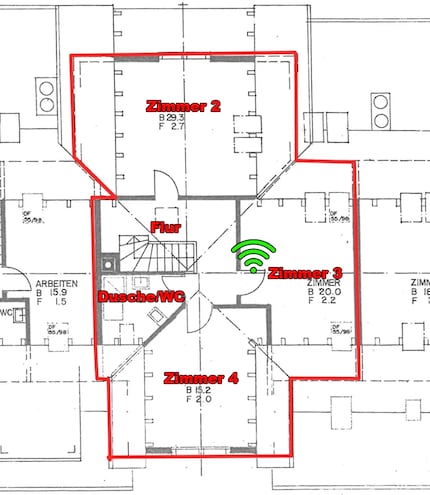
Setting it up
Once I've set up the device and plugged in all the necessary cables, I download the Orbi app on my phone. I use it to scan a QR code on a bit of plastic attached to the router on delivery. The satellite also comes with a QR code, but I don't have to scan it to set it up. The same goes for the sync button – I don’t have to press it a single time. The satellite is automatically recognised and integrated into the system when I scan the router's QR code. Within a few minutes, the new mesh is ready to use.
Both devices offer the same number of gigabit ports (four) and are hard to tell apart from the outside. They're the same size – 25.4 × 7.1 × 19.1 cm – feature the same design, the same number of antennas and the same front LED lights, which only flash when setting up or restarting.
It's only the extra 2.5 gigabit WAN port and the label «router» that removes any danger of confusion.
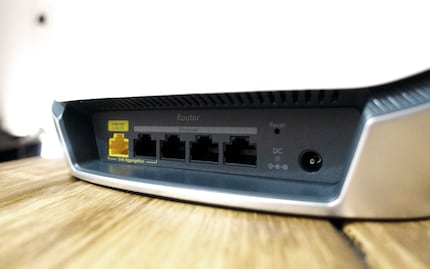
By the way, the product's smartphone app is only good for initial set-up. If I want to dig deeper into the settings or change the router's mode of operation from router to access point, I have to sign into the web interface in a browser. Either by typing in the router IP or going to http://orbilogin.com. I can log in using the username and password I set during initial set-up.
Speed, ping and signal strength per room
As always when testing, I give the kit at least three days to settle down before I get started. But within the first few hours of setting up the new mesh, I notice that my portable devices quickly switch from the router to the satellites and vice versa when I go between floors. With Swisscom and Asus, it only settled down and worked seamlessly after a couple of days.
I always use the same ax-compatible notebook for these tests. My NAS acts as the opponent in the network. I use software called «LAN Speed Test» to determine the speed, and ping my NAS to check the latency. Thanks to «NetSpot» software, we can see signal strength and related heat maps.
Results
Here's how Netgear's Orbi AX6000 mesh performed:
| Location | 5 GHz band
Speed / Ping / Signal strength | 2.4 GHz band
Speed / Ping / Signal strength |
|---|---|---|
| Foyer | 811.49 Mbps / 5 ms / -42 dBm | 138.31 Mbps / 5 ms / -46 dBm |
| Living room | 491.06 Mbps / 6 ms / -62 dBm | 121.36 Mbps / 6 ms / -59 dBm |
| Dining room | 595.58 Mbps / 6 ms / -67 dBm | 122.55 Mbps / 6 ms / -53 dBm |
| Kitchen | 778.70 Mbps / 6 ms / -56 dBm | 136.91 Mbps / 6 ms / -47 dBm |
| Balcony | 242.13 Mbps / 7 ms / -73 dBm | 107.67 Mbps / 6 ms / -68 dBm |
| Room 1 | 630.94 Mbps / 6 ms / -59 dBm | 124.03 Mbps / 6 ms / -56 dBm |
| Bathroom | 658.33 Mbps / 5 ms / -53 dBm | 126.12 Mbps / 5 ms / -59 dBm |
| Hallway | 781.25 Mbps / 3 ms / -57 dBm | 138.48 Mbps / 3 ms / -52 dBm |
| Room 2 | 523.91 Mbps / 4 ms / -67 dBm | 119.49 Mbps / 4 ms / -58 dBm |
| Room 3 | 823.81 Mbps / 3 ms / -42 dBm | 140.82 Mbps / 3 ms / -38 dBm |
| Room 4 | 554.67 Mbps / 4 ms / -67 dBm | 127.74 Mbps / 4 ms / -60 dBm |
| Shower/WC | 663.82 Mbps / 3 ms / -55 dBm | 138.92 Mbps / 3 ms / -57 dBm |
| Ø | 629.64 Mbps / 5 ms / -58 dBm | 128.53 Mbps / 5 ms / -54 dBm |
On average, the signal strength remained above -59 dBm. The balcony registered the worst signal at -73 dBm, which is still good. It wouldn't be precarious until about -80 dBm. My balcony could well be bigger, in that sense. This is confirmed by Balconyland’s 5 GHz speed; 242.14 Mbps is the equivalent of nine or ten Netflix UHD streams or about four Blu-ray UHD streams.
The highest speed I detect in room 3 is actually not the same as the figure the router promises. The maximum speed possible on my gigabit LAN is, in fact, 824 megabits or 103 megabytes per second. An average speed of 629.64 Mbps on the 5 GHz band is fantastic and unexpected. There's hardly any difference between the router and satellite when it comes to speed loss. The backhaul works perfectly. In contrast, my measurements in the 2.4 GHz band don't reveal any surprises. It's a solid performance.
Netgear has some room for improvement with the latency. There's a ping of two milliseconds between the router and satellite.
5 GHz range heat map
The Orbi AX6000 heat maps looks about the same as that of the Asus and Swisscom mesh systems I’ve tested. The competition proves to even have slightly better coverage in the 5 GHz band – something I expand on below. But good coverage is only of use if the router and satellite also communicate well.
As a quick reminder: high values are better. The more blue the colour, the worse the signal strength.


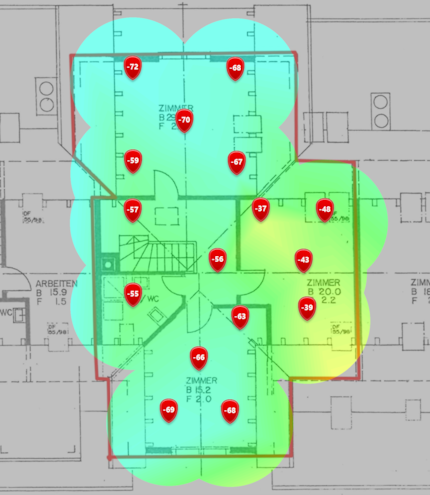
2.4 GHz range heat map
On average, Netgear delivers -54 dBm. I haven't seen a better range in the 2.4 GHz band, neither on the Swisscom nor Asus router.



Comparison with the competition
We've laid the numbers bare for a side-by-side comparison. How did the Orbi fare against the competitor mesh systems?
The 5 GHz comparison:
| Location | Netgear Mesh: Orbi AX6000 (Router + Satellite) | Swisscom Mesh: Internet-Box 3 + WLAN-Box 2 | Asus Mesh: ZenWiFi AX (2 x Router) |
|---|---|---|---|
| Foyer | 811.49 Mbps / 5 ms / -42 dBm | 415.33 Mbps / 3 ms / -40 dBm | 403.54 Mbps / 3 ms / -47 dBm |
| Living room | 491.06 Mbps / 6 ms / -62 dBm | 392.59 Mbps / 4 ms / -59 dBm | 369.18 Mbps / 4 ms / -64 dBm |
| Dining room | 595.58 Mbps / 6 ms / -67 dBm | 390.04 Mbps / 4 ms / -58 dBm | 375.33 Mbps / 4 ms / -64 dBm |
| Kitchen | 778.70 Mbps / 6 ms / -56 dBm | 396.55 Mbps / 3 ms / -55 dBm | 378.62 Mbps / 4 ms / -62 dBm |
| Balcony | 242.13 Mbps / 7 ms / -73 dBm | 238.47 Mbps / 4 ms / -70 dBm | 228.74 Mbps / 5 ms / -75 dBm |
| Room 1 | 630.94 Mbps / 6 ms / -59 dBm | 396.21 Mbps / 3 ms / -54 dBm | 394.79 Mbps / 4 ms / -55 dBm |
| Bathroom | 658.33 Mbps / 5 ms / -53 dBm | 378.08 Mbps / 3 ms / -55 dBm | 351.46 Mbps / 3 ms / -53 dBm |
| Hallway | 781.25 Mbps / 3 ms / -57 dBm | 743.90 Mbps / 2 ms / -48 dBm | 736.91 Mbps / 3 ms / -52 dBm |
| Room 2 | 523.91 Mbps / 4 ms / -67 dBm | 461.16 Mbps / 3 ms / -63 dBm | 448.25 Mbps / 3 ms / -57 dBm |
| Room 3 | 823.81 Mbps / 3 ms / -42 dBm | 823.72 Mbps / 2 ms / -40 dBm | 761.64 Mbps / 2 ms / -39 dBm |
| Room 4 | 554.67 Mbps / 4 ms / -67 dBm | 492.75 Mbps / 3 ms / -60 dBm | 539.08 Mbps / 3 ms / -58 dBm |
| Shower/WC | 663.82 Mbps / 3 ms / -55 dBm | 656.87 Mbps / 2 ms / -55 dBm | 620.73 Mbps / 3 ms / -54 dBm |
| Ø | 629.64 Mbps / 5 ms / -58 dBm | 482.14 Mbps / 3 ms / -55 dBm | 467.36 Mbps / 3 ms / -57 dBm |
If we look at the floors individually, Netgear delivers 669 Mbps in 5 GHz on the upper storey, while Swisscom and Asus deliver 636 Mbps and 621 Mbps respectively. On the lower floor of the top storey duplex, Asus delivers 357 Mbps, Swisscom 372 Mbps and Netgear 601 Mbps. A crushing comparison that shows that Swisscom and Asus have problems with their backhaul. Or if you look at it from another point of view, it shows Netgear has a better handle on mesh technology. On average, the Orbi AX6000 reaches 629.64 Mbps although the signal strength is slightly inferior overall.
The 2.4 GHz comparison:
| Location | Netgear Mesh: Orbi AX6000 (Router + Satellite) | Swisscom Mesh: Internet-Box 3 + WLAN-Box 2 | Asus Mesh: ZenWiFi AX (2 x Router) |
|---|---|---|---|
| Foyer | 138.31 Mbps / 5 ms / -46 dBm | 148.02 Mbps / 4 ms / -44 dBm | 165.63 Mbps / 3 ms / -43 dBm |
| Living room | 121.36 Mbps / 6 ms / -59 dBm | 112.12 Mbps / 5 ms / -58 dBm | 124.99 Mbps / 4 ms / -59 dBm |
| Dining room | 122.55 Mbps / 6 ms / -53 dBm | 111.37 Mbps / 5 ms / -63 dBm | 156.81 Mbps / 4 ms / -52 dBm |
| Kitchen | 136.91 Mbps / 6 ms / -47 dBm | 126.56 Mbps / 4 ms / -56 dBm | 149.05 Mbps / 4 ms / -48 dBm |
| Balcony | 107.67 Mbps / 6 ms / -68 dBm | 80.81 Mbps / 5 ms / -72 dBm | 113.15 Mbps / 4 ms / -66 dBm |
| Room 1 | 124.03 Mbps / 6 ms / -56 dBm | 112.98 Mbps / 4 ms / -63 dBm | 159.92 Mbps / 3 ms / -58 dBm |
| Bathroom | 126.12 Mbps / 5 ms / -59 dBm | 110.25 Mbps / 4 ms / -61 dBm | 155.36 Mbps / 3 ms / -55 dBm |
| Hallway | 138.48 Mbps / 3 ms / -52 dBm | 135.74 Mbps / 3 ms / -58 dBm | 157.38 Mbps / 3 ms / -53 dBm |
| Room 2 | 119.49 Mbps / 4 ms / -58 dBm | 96.16 Mbps / 4 ms / -64 dBm | 100.19 Mbps / 3 ms / -62 dBm |
| Room 3 | 140.82 Mbps / 3 ms / -38 dBm | 169.53 Mbps / 2 ms / -43 dBm | 166.24 Mbps / 2 ms / -51 dBm |
| Room 4 | 127.74 Mbps / 4 ms / -60 dBm | 94.09 Mbps / 4 ms / -64 dBm | 105.87 Mbps / 3 ms / -64 dBm |
| Shower/WC | 138.92 Mbps / 3 ms / -57 dBm | 109.47 Mbps / 3 ms / -58 dBm | 122.66 Mbps / 3 ms / -59 dBm |
| Ø | 128.53 Mbps / 5 ms / -54 dBm | 117.26 Mbps / 4 ms / -59 dBm | 139.77 Mbps / 3 ms / -56 dBm |
When we compare the 2.4 GHz band, Netgear snags second place. But it has the best signal strength.
Asus and Swisscom managed to take a slight lead with the latency in both frequency bands. This comes down to the fact that, despite the incredibly fast connection, there's a ping of two milliseconds between the router and the satellite.
Verdict: Orbi is more convincing than any system to date
I christened the SSID in my Orbi network Urbi. If you'll let me go all Latin on you. Orbi, the world, and Urbi, the city, bring so much communicatio to my duplex vicus sine filum.
I'm impressed by the 629.64 Mbps, which is the average I get on the 5 GHz band.
The only negative is the two millisecond latency compared with the competition I’ve tested. In view of the huge increase in performance, this seems small fry.
I'm now going off in search of an even faster mesh system. Maybe one that's a bit cheaper.
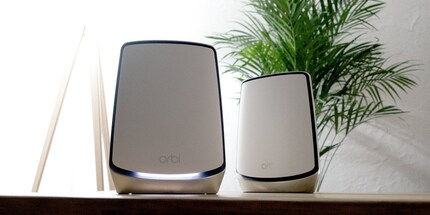
But, to be fair, I should also mention that the competitor models in this article didn't have many antennas. Asus has six per device, and I'm not so sure about Swisscom. That's why the comparison is a bit inappropriate. But actually, maybe not. After all, a more expensive device with more performance can also mean a longer life cycle before the device is replaced again with better hardware.
If you want to read more about mesh Wi-Fi speed tests, let me know by hearting this article and hitting the «Follow author» button.
I find my muse in everything. When I don’t, I draw inspiration from daydreaming. After all, if you dream, you don’t sleep through life.
